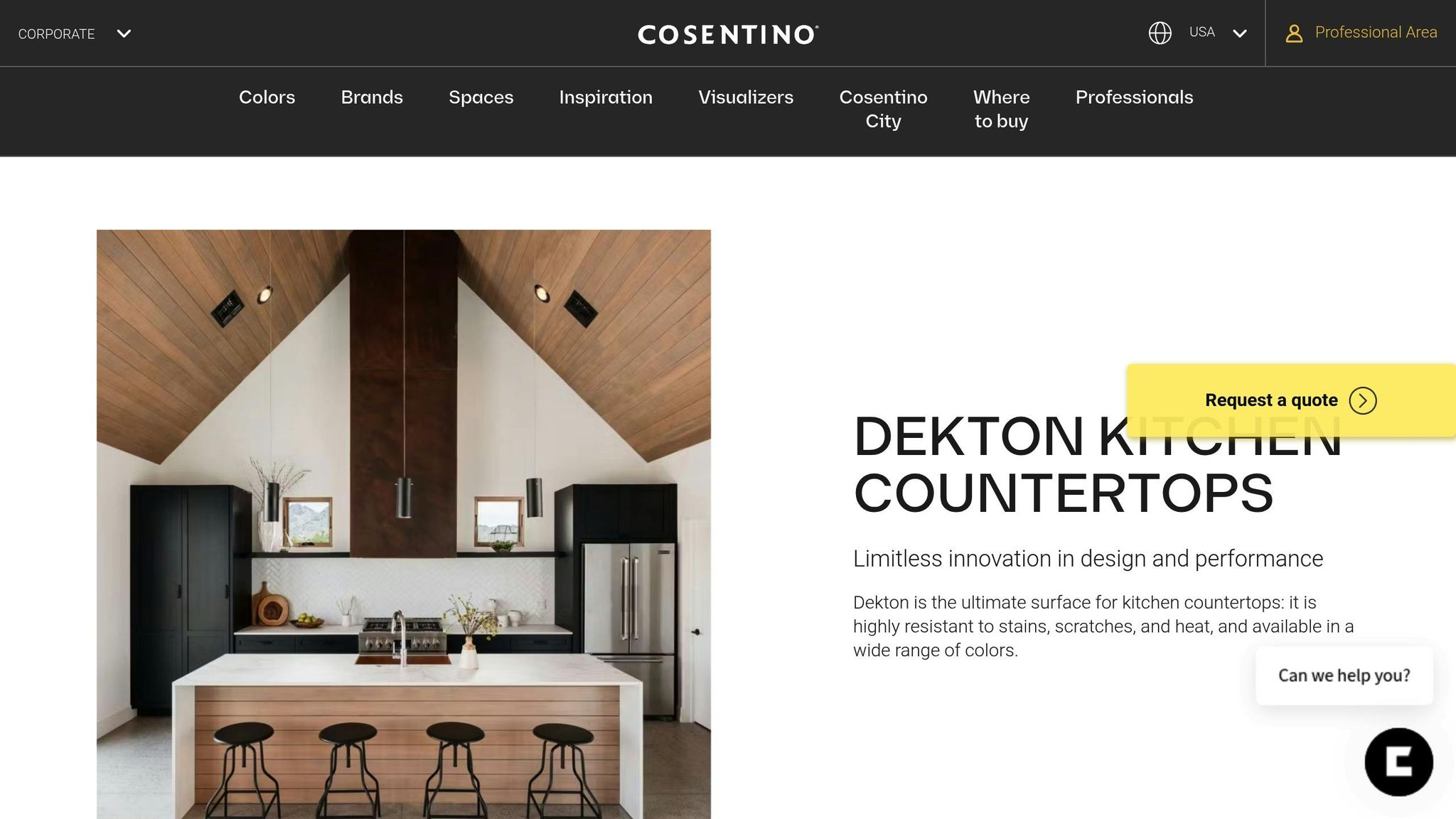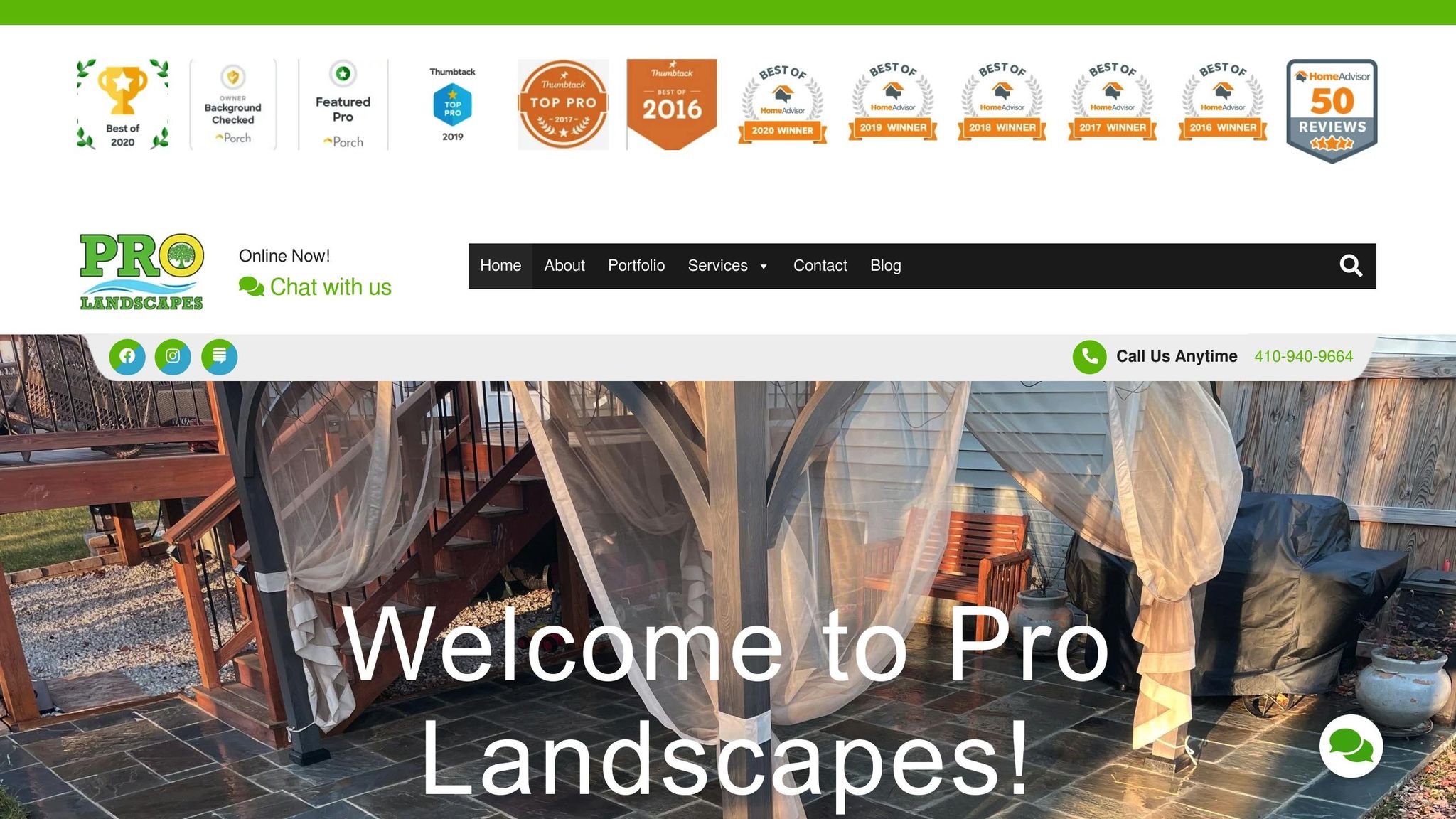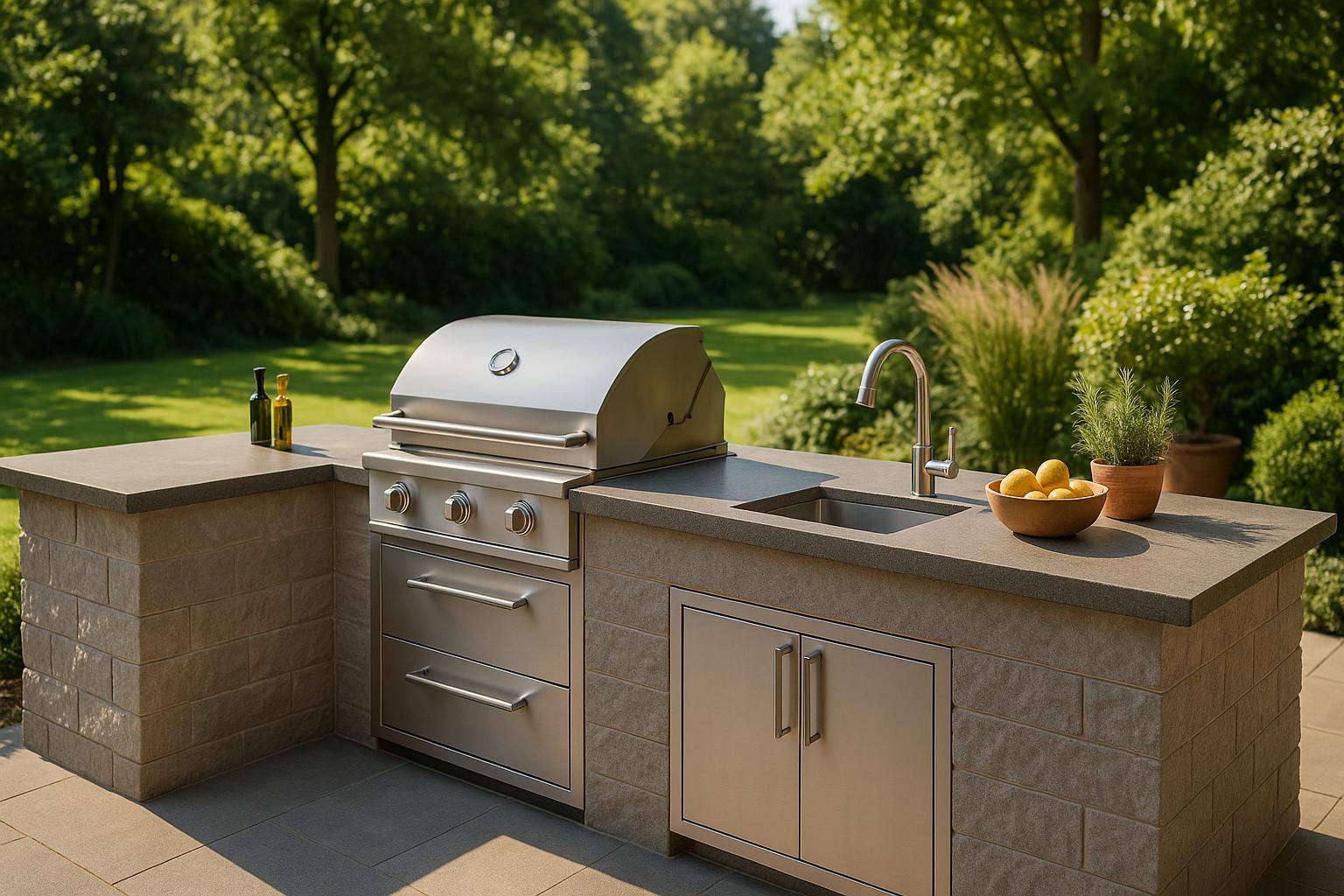- bhavya gada
- No Comments
Choosing the right outdoor kitchen countertop is critical for durability, functionality, and style. Maryland’s climate – with its hot summers, freezing winters, and high humidity – makes material selection even more important. Here’s a quick breakdown of the best options:
- Granite: Durable, heat-resistant, and ideal for Maryland’s weather but requires sealing.
- Quartzite: Extremely strong and UV-resistant; slightly porous but manageable with regular sealing.
- Marble: Elegant but high-maintenance and prone to staining in outdoor conditions.
- Soapstone: Non-porous and weather-resistant but softer and prone to scratches.
- Porcelain: Lightweight, UV-resistant, and low-maintenance, perfect for outdoor use.
- Dekton: Highly durable, scratch-proof, and weather-resistant, though more expensive.
- Concrete: Customizable and sturdy but needs proper sealing and reinforcement to prevent cracking.
Key factors to consider:
- Weather resistance: Materials must handle Maryland’s freeze-thaw cycles and UV exposure.
- Maintenance: Non-porous materials like Dekton and porcelain require less upkeep.
- Food safety: Non-porous surfaces are hygienic and ideal for food prep.
- Cost: Prices range from $15/sq ft for DIY concrete to $200/sq ft for premium materials like quartzite or Dekton.
Best picks for Maryland: Quartzite, porcelain, and Dekton stand out for their durability and low maintenance. Granite is also reliable but needs periodic sealing. Avoid marble unless you’re ready for high upkeep.
For long-lasting results, professional installation is recommended, especially for heavy materials like granite and quartzite. Proper sealing, reinforcement, and drainage are crucial to withstand Maryland’s climate challenges. Working with experts like Pro Landscapes MD ensures your outdoor kitchen is built to last.
Outdoor Kitchen Countertop Ideas Best Options for Relaxing
Key Factors When Choosing Outdoor Countertop Materials
Picking the right material for your outdoor kitchen isn’t just about looks – it’s about functionality and longevity, too. Maryland’s unpredictable weather means your countertop needs to stand up to the elements while remaining practical for food prep. Let’s break down the most important considerations.
Weather Resistance and Durability
Outdoor countertops face a tough job: they have to handle everything from blazing sun to freezing temperatures without breaking down. Maryland’s climate, with its temperature swings, demands materials that won’t crack under pressure. UV exposure can also cause some surfaces to fade or deteriorate, so it’s smart to choose materials that hold their color and finish over time.
Granite and quartzite are popular choices for their strength and resilience, while high-quality engineered materials are designed to stay intact even in harsh conditions. Don’t forget about moisture – water can wreak havoc if it seeps into porous surfaces. Opt for non-porous materials or make sure your countertop is properly sealed to avoid water-related damage.
Maintenance Requirements and Lifespan
How much time do you want to spend maintaining your countertop? Some materials need regular resealing or special cleaning, while others are practically hands-off. Engineered surfaces, for example, are low-maintenance and easy to clean.
Durability also ties into the countertop’s lifespan. Investing in high-quality materials usually means you’ll get a longer-lasting surface. Beyond maintenance and durability, though, your countertop should also support safe and hygienic food preparation.
Safety and Food Preparation Features
Durability is a must, but food safety is just as important. Non-porous surfaces are ideal because they don’t absorb liquids or harbor bacteria. Porous materials, on the other hand, can trap foodborne pathogens, posing a health risk [2]. Quartz is a standout here – it’s engineered to be non-porous, making it a top choice for hygienic food prep [3].
Cleaning ease is another big factor. Stainless steel countertops, often found in professional kitchens, are popular because they’re easy to sanitize and naturally hygienic [2]. Fewer seams on a countertop also mean less chance for food residue or bacteria to build up [3]. For added versatility, choose a surface that resists both heat and chemicals. While heat-resistant countertops can handle hot pots and pans, always use a cutting board to protect the surface and prevent cross-contamination [2][3].
Types of Outdoor Kitchen Countertop Materials
When designing an outdoor kitchen, the choice of countertop material can make a big difference in both style and practicality. Let’s explore the options, each with its own perks and challenges, to help you pick the right fit for your Maryland outdoor space.
Natural Stone Options: Granite, Quartzite, Marble, and Soapstone
Natural stone is a classic choice for outdoor countertops, offering both durability and timeless beauty. As StoneMark emphasizes:
Quality and durability should be at the top of your decision-making when selecting the perfect countertop for your outdoor kitchen or patio area [4].
Granite is a favorite for outdoor kitchens, and for good reason. It handles Maryland’s fluctuating temperatures without cracking and is tough enough to withstand the heat from grills and hot pans [4]. Its natural UV resistance makes it a smart pick, although lighter shades may show minor fading after years of direct sunlight [8]. Since granite is porous, regular sealing is necessary to prevent stains and mold [5].
Quartzite combines granite’s strength with even better scratch and heat resistance [4]. It also offers the elegant look of marble while being more durable [5]. However, some quartzite varieties can be slightly porous, so cleaning spills quickly is a must to avoid stains [5].
Marble brings a touch of elegance but requires extra care. For outdoor use, a honed or leather finish is recommended:
Marble is recommended for outdoor kitchens in a honed or leather finish. Like all natural stone, it is heat resistant, and harder marbles will hold better when exposed to the weather conditions [6].
These finishes not only enhance durability but also help mask etching caused by acidic substances.
Soapstone offers a softer, more rustic aesthetic. Its non-porous nature makes it hygienic for food prep, but it is softer than granite or quartzite, making it prone to scratches [4]. Applying mineral oil can deepen its color and give it a polished look [6]. Despite its softness, soapstone handles Maryland’s temperature swings and moisture levels well.
If you’re after a modern look with less upkeep, engineered materials might be the way to go.
Engineered Materials: Porcelain and Dekton

Engineered countertops are designed to tackle outdoor challenges while keeping maintenance low. Porcelain slabs are a versatile option, offering a wide range of designs, from marble and granite imitations to metallic finishes [7]. They’re UV-resistant, though some slabs may fade slightly after prolonged exposure [7]. Porcelain is also budget-friendly and easier to install compared to other materials.
Dekton, a composite of porcelain, glass, and quartz, is known for its exceptional durability. It resists scratches, stains, heat, and UV rays, making it a standout choice for outdoor kitchens [9][7]. As one expert puts it:
Dekton porcelain slab excels in scratch, stain, heat, and UV resistance, with minimal maintenance and a modern, consistent look [8].
When deciding between the two:
Choose Dekton if you want extreme durability, and Porcelain if you prefer affordability and ease of installation [7].
Although Dekton tends to have a higher upfront cost, its long-term performance often makes it worth the investment. Both materials are low-maintenance due to their non-porous surfaces, with Dekton being particularly praised for requiring virtually no upkeep [8].
For a more personalized touch, concrete countertops offer unmatched customization.
Concrete Countertops
Concrete countertops allow for endless customization, making them a great option for outdoor kitchens. You can shape them into unique designs, choose from a variety of colors, and even embed decorative elements like glass or stone. Plus, concrete is more durable than quartz for outdoor use [10].
Costs vary widely. If you’re a DIY enthusiast, you can create concrete countertops for as little as $15–$25 per square foot [10]. On the other hand, professional installation, which ensures a polished and durable finish, typically ranges from $75 to $125 per square foot.
Jon Bell, Head of Manufacturing at RTA Outdoor Living, highlights the challenges of working with concrete:
Concrete does two things: it gets hard, and it cracks. Reinforcement keeps it from cracking [11].
He adds:
To finish the concrete, it’s half talent and half patience. Knowing when to trowel it, and when not to [11].
To minimize cracking caused by temperature changes, proper reinforcement and expert finishing are essential. Regular sealing is also important to prevent stains and water damage. Concrete countertops are a versatile choice that works well with Maryland’s diverse outdoor kitchen designs.
Countertop Material Comparison Chart
Choosing the right outdoor countertop involves weighing several performance factors. Below is a handy chart summarizing key aspects to help you make an informed decision.
| Material | Durability | Heat Resistance | Moisture Resistance | Maintenance | Cost Range | Maryland Climate Performance |
|---|---|---|---|---|---|---|
| Granite | High | Excellent | Good (requires sealing) | Moderate (seal every 3-5 years) | $50-$150+ per sq ft | Very Good |
| Quartzite | High | Excellent | Excellent (with sealing) | Low (seal annually) | $75-$200+ per sq ft | Excellent |
| Marble | Moderate | Moderate | Poor (porous, stains easily) | High (frequent sealing, careful cleaning) | $90-$180+ per sq ft | Poor |
| Soapstone | Good | Excellent | Excellent | Low (monthly oil treatment) | $40-$100 per sq ft | Excellent |
| Porcelain | Excellent | Excellent | Excellent | Very Low | $60-$100 per sq ft | Excellent |
| Dekton | Very High | Excellent | Excellent | Very Low | $100-$200+ per sq ft | Excellent |
| Concrete | High | Good | Moderate (requires sealing) | Moderate (sealing, crack repair) | $15-$125 per sq ft | Good |
Maryland’s Climate Considerations
Maryland’s weather swings from hot, humid summers to freezing winters, making durability and moisture resistance key for outdoor countertops. As European Granite Design emphasizes:
Outdoor kitchens require more than just good looks [1].
Cost vs. Performance
Initial price tags can be deceiving. Long-term value often depends on maintenance and durability.
- Granite stands out for its balance of performance and cost, starting at $50 per square foot and reaching $150+ for premium options [13]. However, it requires sealing every 3-5 years to maintain its stain resistance.
- Quartzite, while pricier, offers unmatched durability and UV resistance, making it a solid investment [13].
- Concrete offers the broadest price range. DIY enthusiasts can spend as little as $15-$25 per square foot, while professional installations can reach $125 per square foot [10]. The quality of the finish and longevity often depend on proper sealing and reinforcement.
Maintenance Realities
Engineered materials like Dekton and porcelain are virtually maintenance-free, requiring just routine cleaning. They resist stains, scratches, and UV damage without the need for sealing [12].
Natural stones demand more care:
- Soapstone needs a mineral oil application once or twice a month to maintain its appearance [13].
- Granite requires sealing every few years to prevent stains and bacteria buildup [13].
Best Picks for Maryland’s Climate
For Maryland’s fluctuating temperatures, thermal expansion resistance is crucial. Materials like quartzite and granite handle these changes well. On the other hand, concrete may develop hairline cracks over time, even with proper reinforcement.
Porcelain is a standout option, thriving in both humid summers and freezing winters without wear [14]. Similarly, Dekton excels in extreme weather, offering year-round reliability with minimal upkeep.
While premium options like Dekton come with a higher upfront cost, their low maintenance and long-term durability often make them the smarter choice. These insights naturally lead into considerations for installation and professional guidance.
sbb-itb-843f8be
Maintenance and Care for Outdoor Countertops
Keeping your outdoor countertops in great shape requires regular upkeep, especially with Maryland’s unpredictable weather. The trick is knowing your countertop material and sticking to a consistent care routine.
Cleaning and Sealing Methods
For everyday cleaning, use a soft, damp cloth to wipe down the surface. Avoid abrasive sponges, and make sure to dry the countertop completely to prevent water spots or mineral buildup. Adjust your cleaning methods based on the material for the best results.
Once a week, go for a deeper clean. Use a mild, low-pH cleanser for natural stones, and for stubborn stains, a baking soda paste works wonders. Steer clear of acidic or abrasive cleaners that could damage the surface. Porcelain countertops can handle oil-based stains with a baking soda and water mix, while tough stains on lighter-colored stones respond well to a diluted hydrogen peroxide solution (always test in an inconspicuous spot first).
To check if your countertop needs resealing, try the water test: if water droplets soak in within 15 minutes, it’s time to reseal. When resealing, work in small sections, apply evenly, and follow the manufacturer’s instructions for how long to let it sit before wiping off excess. This simple step helps prevent moisture and stains, keeping your countertop in top condition.
For stain removal, the approach depends on the type of stain:
- Oil-based stains: Use a poultice made from baking soda and water.
- Organic stains (coffee, wine, etc.): Light-colored stones respond well to hydrogen peroxide.
- Rust or metallic stains: Use a specialized cleaner designed for natural stone.
"Proper sealing, cleaning, and protection ensure your countertops remain in excellent condition, enhancing their longevity and aesthetic appeal." – STONE
By staying consistent with care, you’ll not only keep your countertops looking great but also extend their lifespan, even in Maryland’s tough weather conditions.
Seasonal Maintenance in Maryland
Maryland’s changing seasons call for adjustments to your maintenance routine. Each season brings unique challenges, and addressing them proactively will keep your countertop in excellent shape.
- Spring: Clean off any winter residue and check for cracks or stains caused by freeze-thaw cycles. Reseal if necessary.
- Summer: Protect your countertop from UV rays and heat. Use trivets and coasters to prevent heat damage, and clean up spills quickly to avoid stains in the hot weather. Regular cleaning is especially important during the busy outdoor cooking season.
- Fall: Remove stains before they set and reseal small areas as needed. This prep work will help your countertop handle the harsher winter conditions.
- Winter: Cover your countertop during long periods of inactivity and avoid using de-icing salts near the surface, as they can damage sealed finishes. Keep the surface clear of snow and ice to reduce the impact of freeze-thaw cycles. For concrete countertops, ensure they’re well-sealed to prevent water infiltration and cracking.
Maryland’s temperature swings can increase moisture risks, so ensure proper drainage around your outdoor kitchen and maintain good ventilation to avoid humidity buildup. Custom-fit covers, retractable awnings, and protective edging can provide extra protection against the elements.
Installation Tips and Professional Services
Installing outdoor countertops in Maryland requires careful planning and expert execution to handle the region’s weather conditions. Materials like granite and quartzite are heavy and need precise handling, making professional installation a smart choice for durability and long-term performance.
Proper Installation Requirements
Successful outdoor countertop installation involves six key steps: planning, measurement, fabrication, site preparation, installation, and finishing. Skipping or rushing any of these steps can lead to costly mistakes.
- Site preparation is the foundation of a smooth installation. Clear the area, level the ground, and make sure all necessary permits are in place. If your design includes sinks or electrical outlets, complete those utility connections before starting the countertop work.
- Structural support is non-negotiable for heavy materials like stone. Base cabinets must be level and sturdy to prevent sagging or cracking under the weight of the countertop.
- Accurate templating is another step you can’t afford to overlook. Even small measurement errors can result in expensive corrections. Professionals create detailed templates to account for every angle, cutout, and edge detail.
- Efficient layouts are particularly important in smaller outdoor spaces. Following a setup like the kitchen work triangle – positioning the cooking area, refrigerator, and sink for easy movement – can make your space more functional.
During the installation phase, precise cuts and careful pre-fitting are essential for perfect alignment. Countertops must be secured to base cabinets using hardware and techniques tailored to the material. Once installed, sealing the surface is crucial to protect against Maryland’s moisture and temperature fluctuations.
Timing the installation around weather conditions is also critical. Rain or extreme temperatures can affect adhesives and sealers, so professional installers often have contingency plans for unexpected weather changes.
For a smooth and durable outcome, it’s best to rely on experts who combine design knowledge with technical skill and an understanding of Maryland’s unique climate.
Why Choose Pro Landscapes MD for Your Outdoor Kitchen

When it comes to professional outdoor kitchen installation, Pro Landscapes MD stands out as a trusted name in central Maryland.
With years of experience, Pro Landscapes MD goes beyond just installing countertops. They specialize in designing and building complete outdoor living spaces, seamlessly integrating patios, walkways, retaining walls, and outdoor kitchens into unified, stylish designs. Their deep understanding of Maryland’s climate – like freeze-thaw cycles, humidity, and seasonal temperature changes – guides their material recommendations and installation techniques, ensuring your outdoor kitchen is built to last.
Pro Landscapes MD also excels in solving drainage challenges, a critical aspect of outdoor kitchen projects. By incorporating solutions like French drains, proper grading, and stormwater management into their designs, they help protect your countertops and cooking area from moisture damage, extending their lifespan.
What sets Pro Landscapes MD apart is their comprehensive service approach. From design to installation, you’ll work with one dedicated team, eliminating the need to juggle multiple contractors. They handle everything – permits, utility connections, structural support, and finishing touches – ensuring a smooth, hassle-free process.
Serving communities across Maryland, including Ellicott City, Columbia, Gaithersburg, Bethesda, Potomac, and Towson, Pro Landscapes MD is well-versed in local building codes and climate-specific challenges. Choosing them means investing in durable materials, expert craftsmanship, and a professional team that will deliver an outdoor kitchen that’s as functional as it is beautiful.
Conclusion
Choosing the right countertop material for your outdoor kitchen in Maryland requires balancing durability, weather resistance, maintenance needs, and personal style. Maryland’s climate – with its freeze-thaw cycles, high humidity, and temperature fluctuations – plays a big role in how well your countertops will perform and how long they’ll last.
Natural stone options like granite and quartzite stand out for their durability and heat resistance, provided they’re maintained properly. Engineered materials like porcelain offer excellent weather resistance and require minimal upkeep, making them a practical choice for the region. Concrete countertops bring a sleek, modern look but need regular sealing to guard against moisture damage. Whatever material you choose, the installation process is just as important as the material itself.
A successful installation hinges on proper structural support, precise measurements, and techniques designed to handle Maryland’s weather challenges. This is particularly crucial for heavy materials like granite, where professional installation ensures both safety and longevity.
Maintaining your countertops is equally essential for keeping them in top shape. Natural stone and concrete surfaces benefit from sealing every 6–12 months, while engineered materials typically only need routine cleaning. Knowing how to care for your chosen material will go a long way in preserving its appearance and functionality over time.
To make the process seamless, working with professionals like Pro Landscapes MD can be a game-changer. Their expertise in material selection, installation, and project management, along with their knowledge of local building codes and drainage solutions, ensures your outdoor kitchen is built to last and look great for years to come.
Ultimately, your outdoor kitchen countertop is more than just a surface – it’s an investment in your outdoor living space. By carefully selecting materials, staying on top of maintenance, and partnering with skilled professionals, you can create a cooking area that’s both beautiful and built to endure Maryland’s diverse climate for decades.
FAQs
What are the most durable countertop materials for outdoor kitchens in Maryland’s climate?
For outdoor kitchens in Maryland, granite, quartzite, and soapstone stand out as excellent choices for countertops. These natural stones are built to handle Maryland’s unpredictable weather, from humid summers to freezing winters, as well as rain and intense sunlight.
Granite and quartzite are particularly popular because they resist UV rays, moisture, and temperature swings, ensuring they remain intact and vibrant for years. Soapstone, on the other hand, offers natural stain resistance and easily endures harsh weather conditions. Beyond their durability, these materials add a touch of elegance to outdoor spaces, making them perfect for Maryland’s climate and aesthetic.
What steps can I take to make my outdoor kitchen countertops last through harsh weather?
To keep your outdoor kitchen countertops in great shape, start by selecting materials that can handle tough weather conditions. Options like granite, quartzite, or porcelain are excellent because they resist scratches, chips, and UV damage. If you choose a porous material like granite, applying a high-quality sealant is essential to guard against moisture and stains.
During extreme weather – think heavy rain, snow, or intense sunlight – protective covers can go a long way in preserving your countertops. Also, steer clear of harsh cleaning chemicals, as they can harm the surface. Regular care, such as quickly cleaning up spills and resealing when necessary, will help your countertops last longer. With the right materials and proper upkeep, your outdoor kitchen will remain both functional and stylish throughout the year.
How do I maintain different types of outdoor kitchen countertops?
How to Maintain Outdoor Kitchen Countertops
Taking care of your outdoor kitchen countertops largely depends on the material they’re made of. For natural stones like granite or marble, stick to cleaning with mild soap and water. Steer clear of abrasive or acidic cleaners, as they can harm the surface. To protect against stains and moisture, make sure to seal these porous surfaces every so often.
When it comes to stainless steel, maintenance is simpler. Use a soft cloth and a non-abrasive cleaner to keep it shiny and rust-free.
Want to extend the life of your countertops? Cover them when they’re not in use to guard against weather damage. Also, avoid harsh chemicals like bleach, which can cause unwanted damage. With consistent care and a little protection, your countertops will stay in great condition for years.


















Chat with Us